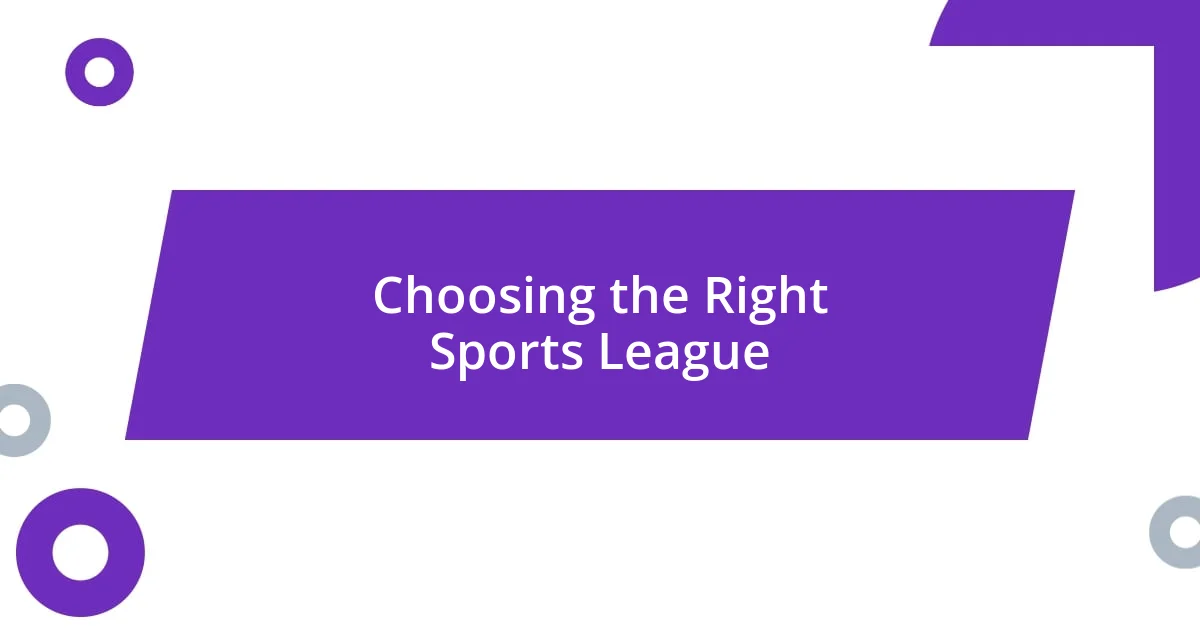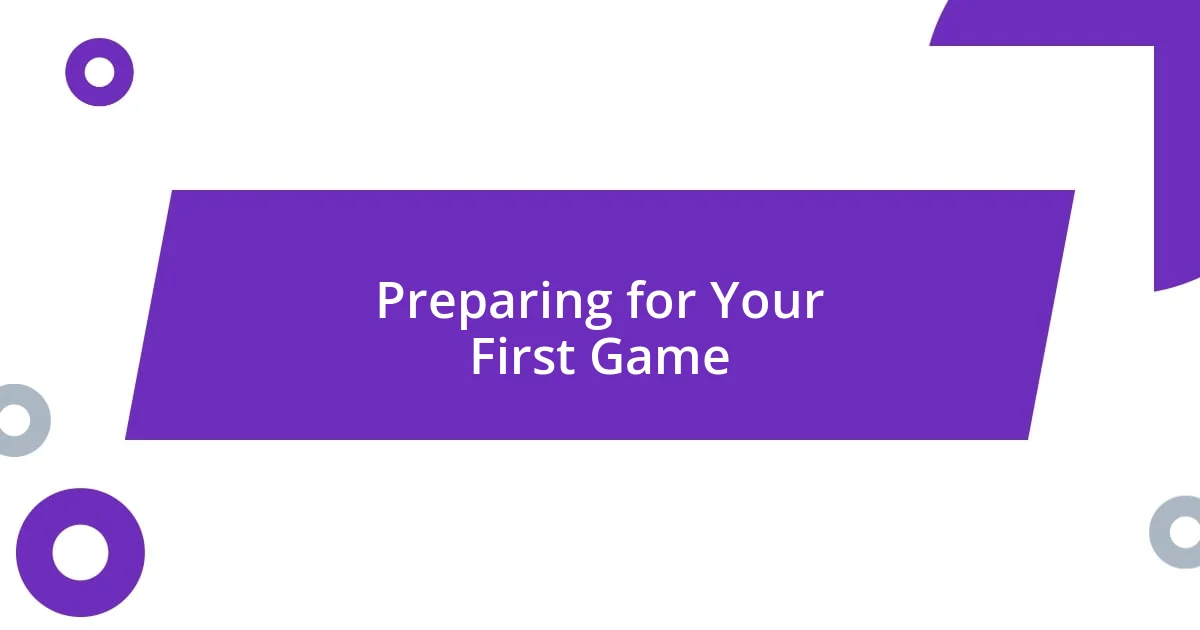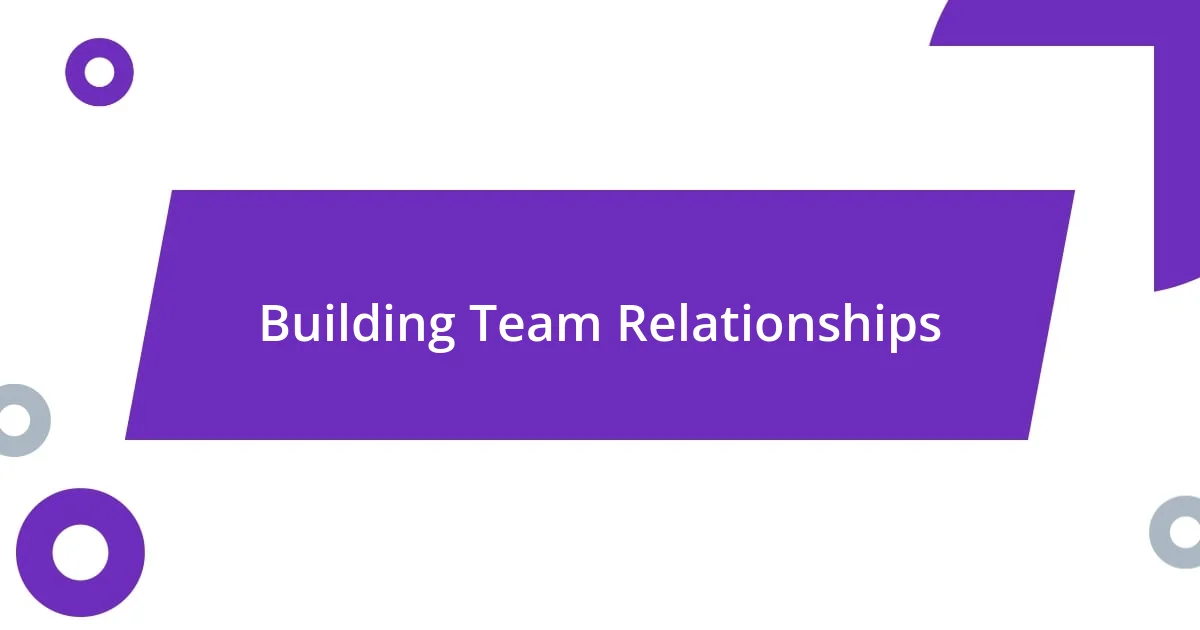Key takeaways:
- Choosing the right sports league is crucial for aligning personal goals, skill levels, and desired community atmosphere.
- Building relationships with teammates enhances the experience through open communication and shared activities, fostering trust and support.
- Reflecting on personal and team performance leads to growth, confidence, and recognition, shaping both individual and collective identities.

Understanding Sports League Options
When I first looked into joining a sports league, I was overwhelmed by the sheer variety of options available. From recreational leagues that focus on fun to more competitive leagues where winning is the primary goal, each choice offers a different atmosphere and level of commitment. Have you ever considered what type of experience you want from a league? It’s essential to reflect on whether you’re looking to improve your skills, make new friends, or simply enjoy a weekend activity.
I remember sitting down with a friend who had been involved in various leagues. She helped me understand that some leagues cater to specific demographics, like age or skill level, while others are more inclusive. There was a local league for every interest, from traditional sports like soccer and basketball to niche options like ultimate frisbee and dodgeball. It made me think—what sport truly excites me? Finding a league that aligns with my passions was a game-changer.
As I navigated through my options, I also discovered the importance of community. Joining a league often means becoming part of a supportive environment, where camaraderie flourishes. There’s something special about sharing the highs and lows of competition with others. Have you ever felt that rush of adrenaline when scoring a goal alongside teammates who’ve become friends? That’s the beauty of making the right choice in a sports league.

Choosing the Right Sports League
When I began my search for the right sports league, I quickly learned that my choice could significantly shape my experience. I vividly recall my first visit to a local soccer league; the energy was electric, and I felt an immediate connection with the players. Choosing a league isn’t just about finding a sport I enjoy; it’s about finding a community that resonates with my personality and goals.
To simplify the decision-making process, here are some factors I considered:
– Skill Level: Is the league suited for beginners, intermediates, or advanced players?
– Commitment: How much time do I want to dedicate? Are there regular practices or just games?
– Atmosphere: Is the focus on competition, casual play, or social interaction?
– Diversity: Does the league accommodate various age groups and backgrounds?
– Location: Is it easily accessible, or am I willing to travel?
Reflecting on these elements not only eased my anxiety but also helped me align my expectations and aspirations. Each consideration offered a deeper insight into what I truly wanted from my league experience.

Preparing for Your First Game
Preparing for your first game can be both exciting and nerve-wracking. I remember feeling a mix of anticipation and anxiety the night before my debut. I spent hours packing my gear, checking and double-checking that I had everything from my uniform to my lucky socks. It’s a small ritual, but it really helped ease my mind. Do you have a similar pre-game routine? Having a checklist can be incredibly beneficial—it helps me feel more organized and less overwhelmed.
When I finally arrived at the field, I truly realized how important warming up is. It’s not just a physical necessity; it’s a mental one, too. I took a moment to stretch and visualize the game ahead, picturing myself making plays or celebrating with teammates. This practice not only prepares my body but also calms my nerves. What do you do to get into the zone before a game? Finding those personal techniques can help enhance your performance on the field.
As game time approached, I focused on staying positive and connecting with my teammates. I distinctly remember a moment before my first game—standing in a huddle, feeling the collective energy around me. That sense of unity was empowering. It reminded me that we were all in this together, and it wasn’t just about individual performance; it was about the team. Have you ever experienced that surge of motivation from your peers? It truly amplifies the thrill of competition.
| Preparation Aspect | Personal Insight |
|---|---|
| Packing Gear | Creating a checklist to ensure I had everything necessary reduced my anxiety. |
| Warming Up | Warming up helped me physically and mentally prepare, easing my nerves before the game. |
| Team Bonding | Connecting with teammates before the game amplified my excitement and motivation. |

Building Team Relationships
Building meaningful relationships with teammates can transform your experience in a sports league. I remember my first practice vividly; we gathered in small groups, sharing stories and laughing about our experiences. That casual vibe helped me realize that forging connections goes beyond skill level—it’s about finding common ground and creating a sense of belonging. Have you noticed how a simple conversation can break the ice and pave the way for camaraderie?
As the weeks went by, I made it a point to step outside my comfort zone. I initiated post-practice hangouts, which I found were crucial for strengthening our team bonds. Those moments away from the field, whether grabbing a bite or simply chatting about life, brought us closer together. I wondered, do you remember an instance where a shared experience helped you connect with someone unexpected? For me, those seemingly trivial moments became the foundation of trust and support within the team.
I also discovered that open communication plays a vital role in team dynamics. During games, we would encourage each other, but I also saw how honest feedback could lead to improvement. I must admit, it was nerve-wracking at first to voice my thoughts, but I soon realized it helped us all grow. It led me to ask, how often do you express your feelings or ideas to your teammates? Recognizing that we were all in this together fostered an environment where everyone felt valued and motivated to contribute their best.

Gaining Skills and Experience
Gaining skills in a sports league is one of the most rewarding aspects of my experience. I recall my first few practices when I stumbled over basic techniques. It was frustrating, but those moments turned into valuable learning opportunities. Each mistake was a stepping stone. Have you ever felt that rush of accomplishment after finally mastering a skill? The sense of progression is truly energizing.
As the weeks rolled on, I began to learn more than just physical skills; strategic thinking became second nature. I remember sitting with my coach after practice, going over gameplay footage. His insights on positioning and decision-making chips away at my understanding of the game in ways I hadn’t anticipated. It’s fascinating how tactical awareness can radically change your performance. Doesn’t it feel great when a lightbulb goes off over your head in a game?
The real magic happened during matches. I found myself in situations that pushed me to adapt quickly, honing my ability to think on my feet. There were moments when the pressure was high, and my heart raced—like when I had to make a split-second decision to pass or shoot. I still remember that thrill. How do you respond to high-pressure scenarios in your own experiences? Embracing those challenges really contributed to my growth, both as an athlete and a teammate.

Evaluating Your Overall Experience
Reflecting on my journey in the sports league, I realize that my overall experience hinged on a mix of personal growth and team success. One memorable moment was during our first big match. As we were warming up, I felt a stirring blend of anxiety and excitement. I remember glancing at my teammates, and their camaraderie bolstered my confidence. That experience taught me how collective energy can propel us beyond our individual limits. Have you ever felt uplifted just by being around supportive people?
I also learned the importance of self-assessment. After each game, we would gather to discuss our performance. I initially dreaded this part, fearing criticism, but I found it surprisingly empowering. Sharing my thoughts and hearing feedback allowed me to refine my skills and understand my role better. Have you taken time to evaluate your own contributions in team settings? Looking back, I now see those discussions as pivotal moments that shaped my playing style and my relationship with my teammates.
Finally, the most rewarding aspect was witnessing my own transformation. I started as someone unsure of their place and emerged as a confident contributor. I remember being recognized as “Most Improved Player” by the end of the season. That moment filled me with a sense of pride and validation that I hadn’t anticipated. Can you recall a situation where your growth was acknowledged in a way that took you by surprise? For me, it underscored that evaluation isn’t just about your performance; it’s about recognizing how far you’ve come, both individually and as part of a team.














